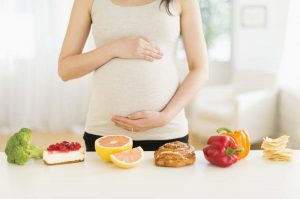There are many physical changes during pregnancy which requires better daily nutritional intake. The Academy of Nutrition and Dietetics provided some recommendations as pregnancy nutrition guide including a balanced diet, an active lifestyle with proportional increase in body weight, regular exercises, and vitamin-mineral supplementations.
Being pregnant does not mean eating for two people as we often hear because a pregnant mother only needs 300 extra calories each day. The calorie increase may come from protein, fruit, vegetables, and whole wheat. Sweet and fatty foods must be limited because although they are high in calorie, these types of food lack nutrition. Maintaining a balanced diet also can reduce nausea and difficulty in defecation, symptoms that are often found in pregnant mothers.
Important foods for pregnancy are:
- Variety of vegetables (for vitamin A and potassium)
- Fruit (for potassium)
- Milk products: yoghurt, low fat milk, soy milk (for calcium, potassium, vitamin A and D)
- Wheat: cereal (for iron and folic acid)
- Protein: nuts, beef, lamb, salmon, or sardines
Foods that are need to be avoided:
- Unpasteurised milk or milk products
- Luncheon meat unless reheated thoroughly
- Raw or semi-cooked seafood, egg, meat. It is not advised to eat sushi with raw fish.
The pregnancy nutrition guide includes supplements which are important for pregnant mothers in order to meet the need for vitamins and minerals during fetal development stage. Some of the major ones are folic acid, iron, calcium, and vitamin D. Sometimes relying on meals only for such minerals and vitamins can cause various deficiencies due to imbalance in food intake.
Iron folic is recommended at 400-600 microgram (0.4-0.6 mg) daily. Sources of folic acid are green vegetables, nuts, oranges, cereals, and supplements. Iron folic can decrease the risk of neural tube defects at birth which can cause paralysis or intellectual disability.
Iron supplement is also important to prevent iron deficiency anemia. The body uses iron to create hemoglobin for red blood cells transporting oxygen throughout the body. During pregnancy, there is more iron need to ensure oxygen supply to the fetus. Anemia symptoms include headache and tiredness, premature birth, low birth weight, and post-partum depression. Eat as much as 27 mg/day of iron found in red meat, chicken, fish, nuts, and vegetables.
Vitamin D and calcium are needed to strengthen the baby’s teeth and bones. The recommendation is 600 IU for vitamin D and 1,000 mg for calcium. The source can be from fish, milk, fruit juice, broccoli, and milk products.
Pregnancy nutrition guide includes a healthy, balanced, and various diet. Avoid foods using preservatives, coloring, and other chemicals because it can cause congenital abnormalities. Weight gain during pregnancy should be closely monitored and consulted at doctor’s visits.
For doctor visit, doctor tele-consultations and home nursing services, please contact Kavacare Support.



